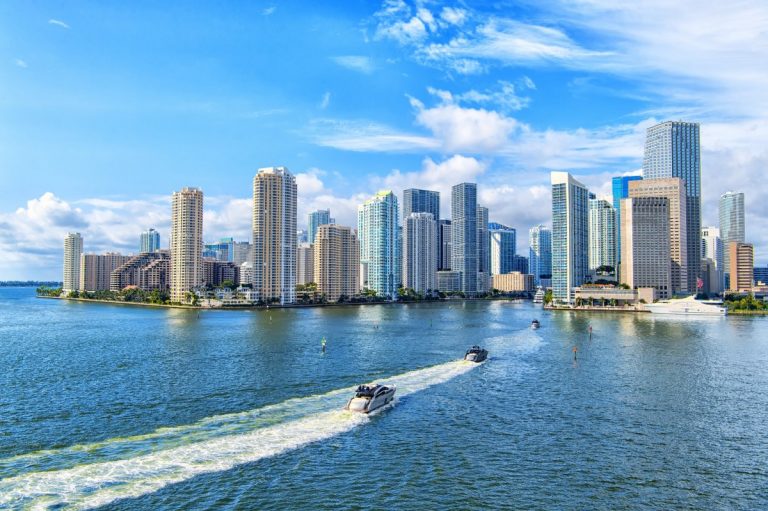
“What’s special about Miami is the collision of cultures. And the white sand beaches and fantastic restaurants.” – Jeffrey Dean Morgan
Set to the mesmerizing backdrop of Miami, the School of Law at the University of Miami is perfectly placed to give any prospective student an enriched education. Offering a plethora of law-based specialisms, on top of faculty experts, links with nearby federal agencies and the added bonus of living in the diverse, unique and cultural hub of Miami, those who study at the School of Law receive a world-class and fulfilling experience.
Founded in 1926, the School of Law is on the 260-acre main campus of one of the largest private research universities in the United States. The school works alongside other premier University of Miami graduate schools with which they offer a range of joint degrees, including (but not limited to) Rosensteil School of Marine Science and School of Business Administration.
“No other law school in the nation is located in a region that affords this exceptional mix of diverse perspectives and opportunities,” the faculty website notes.

The university sits in the middle of the bustling central business neighbourhood of Coral Gables. Home to many great restaurants, shops and fellow student hubs like South Miami, South Beach and “Little Havana”, the school’s backdrop teems with vibrant activity students become immersed in.
The School of Law is in prime place for those keen to pursue Intellectual Property/IP Law, offering an array of IP courses to obtain a solid understanding of law, business and innovation. Additionally, studying in South Florida – an emerging center for start-ups and innovations fuelled by an influx of global creativity – presents an array of hands-on opportunities you’d be hard-pushed to find elsewhere.
Another unique pathway students here undertake is the LL.M. in Entertainment, Arts and Sports Law, exclusively available at the Miami School of Law. This practically-facing degree teaches students how to negotiate and draft transactional agreements specific to the entertainment, arts and sports industries.
“They gain skills of high value which can provide the tipping point for attorneys contending for jobs in very competitive areas,” the website explains.
Those looking to study Maritime Law will find the perfect haven for their studies in Miami. The cruise capital of the world holds the largest single-ship cruise terminal and all major companies have a hold for their business minutes from the Port of Miami.
“Miami Law has only been positive and rewarding, I can attribute the contacts I have made in the maritime law field to the guidance and support I have received from Miami Law’s faculty, and of course, being situated in Miami,” writes former student, Danielle Gauer, on her experience at the school.
On the US and Transnational Law for Foreign-Trained Lawyers program, students find an inclusive and innately personal touch. Each student’s course of study is tailor-made for the individual based on specific interests and careers goals. Here, students benefit from working alongside the Program Director who serves as a personal Academic Advisor, and settles on the best individualized program for each student. “The LL.M. Was one of the most fulfilling experiences I have ever had,” says alumnus, Augusto Aragone.

South Florida is a known goldmine for business and professional growth. The connections made through studying at the School of Law aids graduates, long-term, for the duration of their career. Miami is currently home to almost 1,400 corporations, including corporate giants like Disney and Sony. The city is also home to dozens of headquarters for US companies like American Airlines and Hewlett-Packard.
Miami is also base for several federal agencies, with the Securities and Exchange Commission and the US Department of Homeland Security hosting offices in the city. As the largest financial capital in the US after New York City, South Florida can be defined as a leading center of international tax planning, arbitration, and asset management, offering the only LL.M. degrees in Taxation of Cross-Border Investment and International Arbitration in the US.
With so many opportunities for graduates to begin their careers in their chosen fields, it’s no wonder that so many international students choose to study with the School of Law at the University of Miami.
The only thing that can equal the education on offer at the school is the lifestyle that Miami grants its eager students. Mr Jeffrey Dean Morgan wasn’t wrong when he recalled the beautiful locale; home to more than 20 beaches, 500 public parks and a temperature not too far from that of the Caribbean, Miami’s sun-bathed shores are sure to drive students towards success.
The cherry on top? Miami’s energetic and lively culture-rich environment, boasting a thriving international arts community elevated by the world-acclaimed City Ballet, international Film Festival and music venues. Students who are fans of sport are also spoiled for choice as the city is home to the Miami Heat, The Miami Dolphins, The Miami Marlins and more. The university campus brims with its own unique culture, being home to the Lowe Art Museum and the Beaux Art Festival – Miami’s oldest juried fine arts fair.
Dean Patricia D. White paints the perfect picture for the school’s surroundings, labelling it: “A magnetic coastal city of exotic beauty and world-class ambience. A major commercial crossroads pulsing with energy. A multicultural mecca reflecting an array of colourful influences.”
If there is a ‘promised land’ of sorts solely for the student market; a place where education, culture, lifestyle and opportunity can mix, then perhaps those looking to study need look no further than Miami’s sunny shores.
Follow Miami School of Law on Facebook, Twitter, YouTube, Flickr, Instagram and LinkedIn







